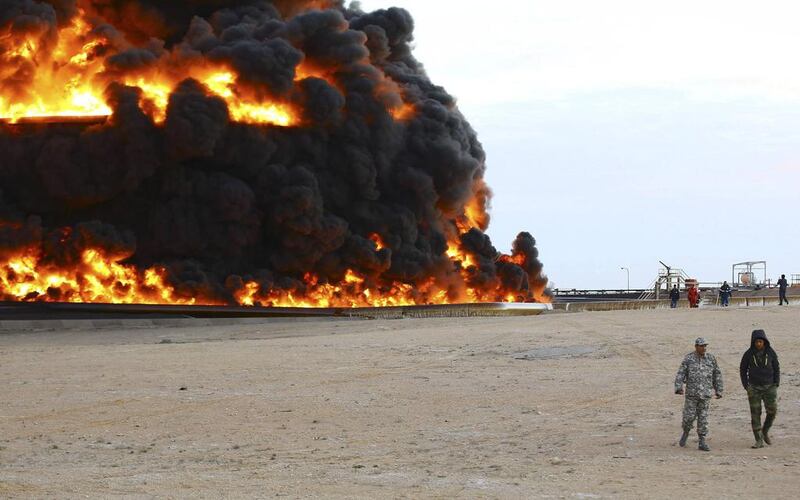Libya is ending a dismal year on a dangerously low note with fighting between Islamist militants and pro-government forces in its "oil crescent", the resource-rich region in the east of the country. Oil production has fallen sharply as a consequence and it's now less than half what it was before the latest clashes. But even that figure – 800,000 barrels a day – is a fraction of what it used to be and Libya's tragedy is that despite Africa's largest reserves, its future seems in free fall, along with oil production, order and governability in general.
Hope seems in perilously short supply too. Consider the state of Libya’s chaos: it is awash with weapons and powerful militias, has rival parliaments as well as governments, with the internationally recognised one holed up in a grey concrete 1970s hotel in Tobruk, 1,000km from the capital Tripoli, which foreign embassies and the United Nations have fled.
It was not meant to be this way, three years and two elections after the Nato-backed overthrow of long-time ruler Muammar Qaddafi. When the revolution triumphed in 2011, aided by a western-led bombing campaign, Libya’s future seemed bright. The French and British leaders were cheered in Benghazi, headquarters of the uprising, when they visited shortly after. Sitting at the strategic intersection of the African, Middle Eastern and western worlds, Libya seemed on the verge of an optimistic new era.
It is now edging towards becoming a failed state, if it is not there already, at least in the view of some. The UN recently reported that there is indiscriminate shelling of civilian areas, abduction of civilians, torture and execution across the country. It has warned that the violent chaos threatens the stability of the region as a whole and Libyan foreign minister Mohamed Dayri recently expressed fears that his country could become another Syria. What, if anything, can the world do?
Perhaps exactly what UN special envoy to Libya, Bernardino Leon, has managed to cobble together for early next month – talks between the rival groups, with hopes of facilitating an immediate ceasefire. This is in line with UN efforts to get all sides to agree that it is time to calm a conflict that has split the country, left its economy in a shambles and its recognised government unable to govern. No one is betting the peace talks will fix Libya but even if they fail, that has to be better than never having tried to succeed.





